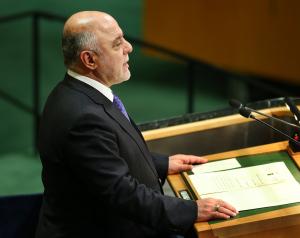LONDON — Nuri al-Maliki, Iraq’s former prime minister, has been accused of undermining his successor, Haider al-Abadi, after allegedly engineering the dismissal of a second senior government minister in the space of a month.
Hoshyar Zebari, who held the finance portfolio, was dismissed in a parliamentary no-confidence vote in September that he claims was both unconstitutional and politically motivated. Zebari, a Kurd, said he believed the vote was part of a hidden political agenda “carried out by the State of Law parliamentary bloc, headed by Nuri al-Maliki.”
He said in a statement that parliamentary Speaker Salim al-Jabouri had been complicit in what Zebari described as a “vindictive, short-sighted” decision that was clearly intended to narrow political agendas.
The removal of Zebari, one of Iraq’s most experienced political leaders, came weeks after a similar parliamentary vote ousted Iraq’s Sunni Defense minister Khalid al-Obeidi.
Both men were central to the Abadi Cabinet — Zebari as the official in charge of overseeing a major international loan to salvage the country’s ailing economy and Obeidi as the one in charge of spearheading the military campaign against the Islamic State.
Michael Knights, a veteran Iraq analyst with the Washington Institute for Near East Policy who had recently returned from Baghdad, commented on Twitter: “I know a guerrilla war when I see one and Maliki is mounting a very effective political insurgency, back on his clandestine home turf.”
Both Zebari and Obeidi, who have dismissed corruption allegations levelled against them, were removed by a simple rather than an absolute majority of the parliament in secret votes, contrary to the constitution.
Zebari said he planned to challenge the vote in the courts. He said his removal would jeopardize efforts to reintegrate Iraq into the world financial system, including implementing a $5 billion loan from the International Monetary Fund.
The IMF has said it was committed to the deal with Baghdad, with or without Zebari.
Maliki’s opponents claim he has exploited divisions within both Kurdish and Sunni factions in parliament to undermine his rivals. Zebari is linked to the Kurdistan Democratic Party, the ruling party in Erbil that is at odds with the opposition Gorran Movement and elements of the rival Patriotic Union of Kurdistan.
Observers have speculated that Maliki’s ultimate target is Abadi himself, although it might take more than a simple majority to remove the prime minister.
Abadi took over in 2014 after vigorous efforts by Maliki to cling to power despite presiding over the loss of Mosul and a large area of Iraqi territory to IS forces. He secured the country’s shared vice presidency for a year until the post was abolished in 2015.
Maliki’s parliamentary power base is the State of Law bloc but he is also widely seen as the mastermind of the shadowy ad hoc Reform Front that groups oppositionists from a number of parties. The Reform Front exploited rivalries within the Sunni block to target Obeidi and generate enough parliamentary support to remove him.
The latest political maneuverings come at a time of intense speculation about when Iraq will launch a long-awaited military offensive to retake Mosul from IS. It is an issue that is likely to be at the top of the agenda when Masoud Barzani, the Kurdish leader and head of the KDP, makes an anticipated visit to Baghdad for talks with Abadi.
The defense post is likely to remain vacant at least until an appeal by the ousted Obeidi makes its way through the courts. Any nominee for a replacement must win the support of parliament and there is a fear that sectarian elements will try to play politics with an appointment that would normally, but not automatically, go to a Sunni.
The hiatus automatically complicates plans for the retaking of Mosul, which explains why the United States lobbied so intensively but unsuccessfully, to retain Obeidi.
The situation could be further complicated if a pro-Iranian, a nominee of the Reform Front or a non-professional ends up with the defense portfolio. Some analysts see it as improbable that an autumn offensive against IS could go ahead without a defense minister in place.
Fuad Hussein, Barzani’s chief of staff, underlined the current political perils when he told Voice of America’s Kurdish service: “Now there is no finance minister, no defense minister, no interior minister.” He said the foreign minister might be the next to go.
“If the policy is to bring down the Iraqi government, this will destabilize the situation because the question is, if this government is to go, who’s going to form the next government?” Hussein said. “How would you form it? When will it materialize? This is a dangerous thing.”
This article originally appeared at The Arab Weekly. Harvey Morris has worked in the Middle East, including Iran and Lebanon, for many years and written several books on the region, including No Friends but the Mountains published in 1993.

COMMENTS
Please let us know if you're having issues with commenting.